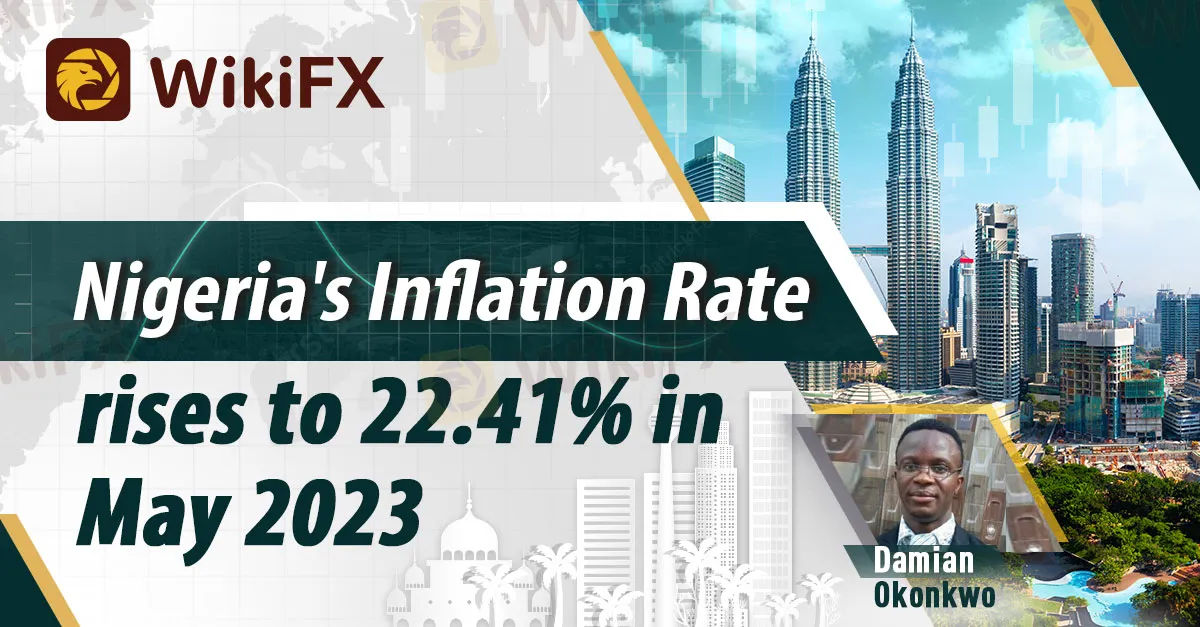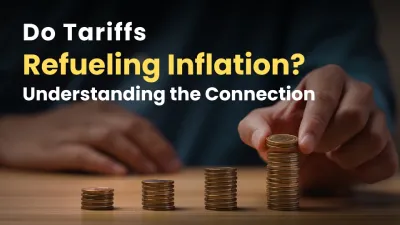简体中文
繁體中文
English
Pусский
日本語
ภาษาไทย
Tiếng Việt
Bahasa Indonesia
Español
हिन्दी
Filippiiniläinen
Français
Deutsch
Português
Türkçe
한국어
العربية
Nigeria's Inflation Rate rises to 22.41% in May 2023
Abstract:Nigeria's inflation rate surged to a seventeen years high in May 2023 by rising to 22.41%. The inflation rate was up by 0.19% compared to its previous level in April 2023 at 22.22%

By: Damian Okonkwo

Nigeria's inflation rate surged to 22.41% in May 2023, this shows an increase of 0.19% compared to the previous record in April when the inflation rate rose to 22.22%. The current inflation rate stands out as the highest level in over 17 years.
The inflation rate on a year-over-year basis increased by 4.70% when compared to the 17.71% inflation rate increase witnessed in May 2022.
The rise in inflation was driven by several factors, including rising food prices, increased transportation costs, and a weaker naira.
Food prices rose by 24.82% in May, with the prices of staple foods such as bread, rice, and beans all rising significantly. Transportation costs also rose, as the price of fuel increased by 14.99%. The naira also weakened against the US dollar, making imported goods more expensive.
The high inflation rate is today a major concern for businesses and consumers. Businesses are facing higher costs, which could lead to higher prices for goods and services. Consumers are facing higher prices, which could reduce their purchasing power.
The high inflation rate is equally a sign of the economic challenges facing Nigeria. The government and businesses will need to work together to find ways to control inflation and improve the economy.
Here are some of the factors that are contributing to the high inflation rate in Nigeria:
· Rising food prices: Food prices are rising due to many factors, including:
· A poor harvest due to drought and other weather-related factors
· Increased demand for food due to population growth.
· Government policies.
· Increased transportation costs.
· Increased fuel prices
· Increased road congestion
· Increased security risks
· A weaker naira: The naira has weakened against the US dollar in recent years, making imported goods more expensive.
Some of the potential consequences of the high inflation rate in Nigeria
Decline in economic growth: High inflation can lead to a decline in economic growth. This is because businesses are less likely to invest and hire new workers when inflation is high.
Rise in poverty: High inflation can lead to a rise in poverty. This is because people have less money to spend when prices are rising.
Social unrest: Rising inflation rates could result in social unrest within the region. This is because people become frustrated when they cannot afford their basic needs.
Conclusion
The rising inflation rate in Nigeria today has several implications for the businesses existing in the region and can increase hardship and social unrest among the citizens. It, therefore, beckons on the government to take urgent steps to bring down the inflation rate to the barest minimum.

Disclaimer:
The views in this article only represent the author's personal views, and do not constitute investment advice on this platform. This platform does not guarantee the accuracy, completeness and timeliness of the information in the article, and will not be liable for any loss caused by the use of or reliance on the information in the article.
Read more

Why Fed Keeps Interest Rates Unchanged, How Does It Affect To Forex Market?
Fed keeps interest rates at 4.25%–4.50%, impacting forex market. Dollar may rise as tariffs loom. Explore why rates unchanged and forex effects.

Do Tariffs Refueling Inflation? Understanding the Connection
Investigate how tariffs impact inflation. Learn how trade barriers influence prices and the broader economic landscape.

Will Trump's Trade Policies Fuel Inflation? BlackRock Warns of Economic Risks
Bitcoin and crypto prices plummet as recession fears and inflation warnings shake markets. Experts warn of prolonged economic challenges ahead.

How Will Central Bank Digital Currencies Could Shape Everything?
Central bank digital currencies (CBDCs) could reshape financial stability, addressing inflation, banking risks, and monetary policy challenges.
WikiFX Broker
Latest News
The Withdrawal Trap: How Scam Brokers Lure Victims into Paying More
FCA to Investors: Think Twice Before Trusting These Brokers
Trump\s tariffs: How could they affect the UK and your money
Trump gambles it all on global tariffs he\s wanted for decades
TradingView Brings Live Market Charts to Telegram Users with New Mini App
Trump tariffs: How will India navigate a world on the brink of a trade war?
Interactive Brokers Launches Forecast Contracts in Canada for Market Predictions
Authorities Alert: MAS Impersonation Scam Hits Singapore
Stocks fall again as Trump tariff jitters continue
IG Group Acquires Freetrade for £160M to Expand UK Investment Market
Currency Calculator







